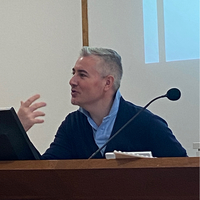Papers by Toby Williamson

97, 2012
The Dementia Engagement & Empowerment Project (DEEP) var et ettårig prosjekt knyttet til å øke br... more The Dementia Engagement & Empowerment Project (DEEP) var et ettårig prosjekt knyttet til å øke brukermedvirkningen blant mennesker som var rammet av demens i England. Prosjektet besto av flere deler: Kartleggingsundersøkelse, litteratursøk, spørreskjema og intervju for å samle inn mest mulig informasjon om grupper og prosjektene over hele England som enten ble ledet av, eller involverte, brukere med demens i utforming av tjenester/ politiske retningslinjer. En nasjonal sammenkomst for å samle grupper med mennesker med demens for å diskutere funnene i undersøkelsene, og se på mulighetene til å danne et nasjonalt nettverk. En publisert rapport og en film som ville beskrive aktivitetene, kunnskapen og informasjonen som skjedde gjennom undersøkelsene og den overnevnte sammenkomsten. En utvidet referansegruppe, bestående av mennesker med demens, for å sikre at de grunnleggende verdiene i DEEP var relevante, meningsfulle og skapt av brukerne selv. Prosjektet var et samarbeid mellom flere sentrale parter på fagfeltet i England ( se naermere s.4 i rapporten). Rapporten beskriver funn fra dette prosjektet. Omsorgsbiblioteket har ikke tilgang til å publisere dette dokumentet i fulltekst. Kanskje ditt lokale bibliotek kan hjelpe deg, eller kanskje du kommer videre med lenken nedenfor.

This Viewpoint explores how 'positive risk-taking' can help communities become dementia-friendly.... more This Viewpoint explores how 'positive risk-taking' can help communities become dementia-friendly. This concept challenges us to think differently about risk for people living with dementia. How can we use its principles to inform understanding of dementia and change attitudes? How can we achieve the benefits and meet the challenges of applying it in practice? NOVEMBER 2014 • The focus of positive risk-taking is on making good decisions about risk; it is the taking of calculated and reasoned risks, not leaving things to chance. • There is no such thing as a risk-free decision; the risk-averse, apparently safe, option comes with its own risks. • It is all too easy to see the negatives and deficits around someone living with dementia and to remain oblivious to their capabilities and potential and those of the resources they may have around them. • Making decisions is exercising power; other people (however well-meaning) often deny people living with dementia this power. • The term 'community' is often ill-defined and abstract. We are dealing with individuals; only they can define their own communities. The term 'neighbourhood' may make more sense to many people. • A dementia-friendly neighbourhood or community will be good for everyone; it is not just about accommodating people living with dementia. • Dementia-friendly neighbourhoods or communities are not risk-free. • Clarity in language enables clarity in thinking; the concepts emerging in health and social care services have wider application, but not if presented in impenetrable jargon.
Mental health today (Brighton, England), Oct 1, 2007

The Dementia Engagement & Empowerment Project (DEEP) var et ettårig prosjekt knyttet til å øke br... more The Dementia Engagement & Empowerment Project (DEEP) var et ettårig prosjekt knyttet til å øke brukermedvirkningen blant mennesker som var rammet av demens i England. Prosjektet besto av flere deler: Kartleggingsundersøkelse, litteratursøk, spørreskjema og intervju for å samle inn mest mulig informasjon om grupper og prosjektene over hele England som enten ble ledet av, eller involverte, brukere med demens i utforming av tjenester/ politiske retningslinjer. En nasjonal sammenkomst for å samle grupper med mennesker med demens for å diskutere funnene i undersøkelsene, og se på mulighetene til å danne et nasjonalt nettverk. En publisert rapport og en film som ville beskrive aktivitetene, kunnskapen og informasjonen som skjedde gjennom undersøkelsene og den overnevnte sammenkomsten. En utvidet referansegruppe, bestående av mennesker med demens, for å sikre at de grunnleggende verdiene i DEEP var relevante, meningsfulle og skapt av brukerne selv. Prosjektet var et samarbeid mellom flere sentrale parter på fagfeltet i England ( se naermere s.4 i rapporten). Rapporten beskriver funn fra dette prosjektet. Omsorgsbiblioteket har ikke tilgang til å publisere dette dokumentet i fulltekst. Kanskje ditt lokale bibliotek kan hjelpe deg, eller kanskje du kommer videre med lenken nedenfor.

The person with dementia has not lost their reason, nor their ability to reason, nor their wish t... more The person with dementia has not lost their reason, nor their ability to reason, nor their wish to reason. The issue for them, and by implication for the rest of us, is that since the onset of dementia they have been progressively failing to store the facts of what they have been doing in their life only a short time before, whilst storing feelings in the normal way. When they find themselves in need of facts which are permanently unavailable to them, making it almost impossible to make sense of what is happening in their life, they very reasonably make the best match they can with intact information from long ago. This can result in their own interpretation of current activity being vastly out of sync with other people around them. If I, whether as a family member or friend, or practitioner, do not understand the way in which they are compensating for their disability by using a supportive resource which I do not need to use, I am likely to view their statements and behaviour as ha...
The Dementia Manifesto, 2019
... Older men's mental health and emotional well-being Toby Williamson INTRODUCTION 'Grum... more ... Older men's mental health and emotional well-being Toby Williamson INTRODUCTION 'Grumpy Old Men'was the name given to a popular TV ... NSF) for Older People in England (DH 2001), which seeks to root out age discrimination, and the forthcoming Equality Bill, which is ...
The Dementia Manifesto, 2019
The Dementia Manifesto, 2019
The Dementia Manifesto, 2019
The Dementia Manifesto, 2019
Working With Older People, 2008
People want to die at home, not in a health or care setting, but in an environment they love and ... more People want to die at home, not in a health or care setting, but in an environment they love and cherish. This is the people's choice. Ahead of the government's forthcoming End of Life strategy, Toby Williamson comments on this new focus on ‘a good death’ and explores what the strategy may hold and its implications.

Working with Older People, 2013
Purpose – The purpose of this paper is to describe the findings from a research project that expl... more Purpose – The purpose of this paper is to describe the findings from a research project that explored the mental health experiences and expectations of the so-called “baby boomer” population born between 1946 and 1955 who are now moving into later life. Design/methodology/approach – The research combined primary and secondary research, and a panel of experts. The primary research was both quantitative and qualitative. Findings – Findings covered issues of identity, health and wellbeing, family and relationships, work, occupation, retirement and financial security, as well as key implications for policy makers, opinion formers and decision makers. Research limitations/implications – The “baby boomer” cohort is extremely large and to provide definitive findings on such a wide range of aspects that potentially influence their mental health requires a much larger study than this as well as one that focuses on particular sub-groups of this cohort. It also raises the question of similarit...









Uploads
Papers by Toby Williamson